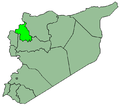Kafr Nabl
Kafr Nabl كَفْرنَبِل Kafranbel | |
|---|---|
Town | |
| Coordinates: 35°36′50″N 36°33′40″E / 35.61389°N 36.56111°E | |
| Country | |
| Governorate | Idlib |
| District | Maarrat al-Nu'man |
| Subdistrict | Kafr Nabl |
| Control | |
| Elevation | 735 m (2,411 ft) |
| Population (2004) | |
• Total | 15,455 |
Kafr Nabl (Arabic: كَفْرنَبِل, romanized: Kafr Nabil, also spelled Kafranbel or Kafr Nabil) is a town administratively belonging to the Idlib Governorate and Ma'arrat al-Numan District in northwestern Syria. It is situated 735 meters (2,411 ft) above sea level. In the 2004 census by the Syrian Central Bureau of Statistics Kafr Nabl had a population of 15,455.[1] In the early 1960s it had a population of about 1,200. Kafr Nabl's inhabitants are predominantly Sunni Muslim.[2]
History
[edit]Kafr Nabl is located on an ancient Byzantine dead city, and is surrounded by some of the most important Dead Cities, such as Serjilla, Shanshrah, and al-Bara.[3]
Prior to the Syrian civil war, Kafr Nabl was Syria's largest producer of figs and a major producer of olives. About 3,700 hectares, or 778,000 trees were used for fig cultivation. Roughly 60% of the population were employed in the production and natural processing of the fruit. Farmers in Kafr Nabl usually dedicated around 80% of their cultivation time to the production of figs and 20% for olives.[4]
Since the civil war, the town has gained fame for producing satirical videos about the war.[5] It belonged to an area controlled by the Army of Conquest.[citation needed]
Planes of the Russian Air Force, based in Latakia, had begun to attack the city in the autumn of 2015.[6][7]
On November 23, 2018, activist Raed Fares and journalist Hamoud Junaid were killed in Kafr Nabl, by an unknown gunman.[8]
Most of the town's remaining inhabitants fled in early 2019, due to the violence that erupted during the 2019 Northwestern Syria offensive.[9] Shortly thereafter, the rebel groups in control of the town received a "stark warning" from Russia, which accused them of using it to stage alleged false-flag chemical attacks against the Syrian government, as well as a launching ground for missiles targeting government-controlled areas in violation of the Idlib demilitarization agreement.[10] On 21 July 2019, the local council of the rebel-held town declared that "everything [in the town] had been destroyed and burnt" as a result of clashes and government airstrikes targeting rebel positions within it.[11]
On February 25, 2020, the Syrian Army reimposed control on Kafr Nabl for the first time since 2012 during the 2019–20 Northwestern Syria offensive and repulsed rebel attempts to re-take it during their counterattack.[12][13]
References
[edit]- ^ General Census of Population and Housing 2004 Archived 2013-02-06 at the Wayback Machine. Syria Central Bureau of Statistics (CBS). Idleb Governorate. (in Arabic)
- ^ Boulanger, 1966, p. 413.
- ^ Carter, 2008, p. 199.
- ^ Giuliani, 2007, p. 24.
- ^ "Syria's war: An unlikely band of brothers". The Economist. 20 September 2013.
- ^ "Wir sind alle Beirut". Zeit Online (in German). 14 November 2015.
- ^ "Russia steps up air strikes against Assad opponents in Syria". Reuters. 10 October 2015.
- ^ Eyad Kourdi; Hilary Clarke; Mohammed Tawfeeq. "Syrian radio host who satirized Assad and ISIS shot dead". CNN. Retrieved 2018-11-26.
- ^ Diyaruna. "Bombarded by regime forces, Idlib province a 'prison for free men'". Diyaruna. Retrieved 2019-07-25.
- ^ "With Idlib in Assad's sights, Russia warns of 'false flag' chemical attacks". The National. Retrieved 2019-07-25.
- ^ اليوم, HalabToday حلب (2019-07-21). "المجلس المحلي في مدينة كفرنبل بريف إدلب الجنوبي يؤكد أن المدينة تتعرض لغارات جوية متواصلة من قبل طيران النظام ويضيف أن "كل شيء يتدمر ويحترق في المدينة"". @HalabTodayTV (in Arabic). Retrieved 2019-07-25.
- ^ "Syrian regime retakes symbolic town of Kafranbel: monitor". rfi.fr. 25 February 2020.
- ^ "قوات النظام السوري تستعيد السيطرة على كفرنبل". euronews.com (in Arabic). 25 February 2020.
Bibliography
[edit]- Giuliani, Alessandra (2007), Developing Markets for Agrobiodiversity: Securing Livelihoods in Dryland Areas, Earthscan, ISBN 978-1-84407-468-6
- Carter, Terry (2008), Syria and Lebanon, Lonely Planet, ISBN 978-1-74104-609-0
External links
[edit]- Al-Ubeidu, Ahmed. Old Mosques in Kafr Nabl From Several Civilizations. E-Idleb. E-Syria. 2011-01-26. (in Arabic)


 French
French Deutsch
Deutsch

